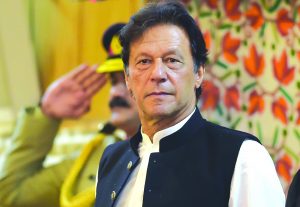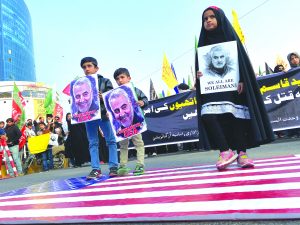 Reham Khan’s narrative reveals the dramatic personae in the tricky power play in the country’s political scenario. Imran Khan dilutes the powers of the National Accountability Bureau (NAB), which could successfully bring country’s most powerful leaders under the corruption laws, got them convicted, but they are out of the prison under the pretext of treatment. Nawaz Sharif, a former Prime Minister and the undisputed leader of the Pakistan Muslim League (Noon) is in London under medical care. Asif Ali Zardari, a former President of Pakistan and husband of the slain leader, Benazir Bhutto, has already been released for medical treatment. Among the top leaders awaiting permission to go abroad is Maryam Sharif, daughter of Nawaz.
Reham Khan’s narrative reveals the dramatic personae in the tricky power play in the country’s political scenario. Imran Khan dilutes the powers of the National Accountability Bureau (NAB), which could successfully bring country’s most powerful leaders under the corruption laws, got them convicted, but they are out of the prison under the pretext of treatment. Nawaz Sharif, a former Prime Minister and the undisputed leader of the Pakistan Muslim League (Noon) is in London under medical care. Asif Ali Zardari, a former President of Pakistan and husband of the slain leader, Benazir Bhutto, has already been released for medical treatment. Among the top leaders awaiting permission to go abroad is Maryam Sharif, daughter of Nawaz.
The voice of the civil society came to the fore when the Pakistani Supreme Court had cancelled the extension of the army chief General Qamar Javed Bajwa and asked the government to formulate a system to give extension to an army chief. The process of the amendment in the law triggered off following the telephonic conversation between US Secretary of State, Michael Pompeo and General Bajwa amidst the growing tensions in the West Asia. Pompeo confirmed his conversation in his twitter that “I spoke to Chief of the Army Staff, General Bajwa, about the US defensive action killing Qasem Soleimani, an Iranian general branded a terror sponsor by the US.
Before the September 11 attacks in 2001, Pakistan and Saudi Arabia were key supporters of the Taliban in Afghanistan, as part of their “strategic depth” objective vis-a-vis India, Iran, and Russia. During the post 9/11, Pakistan, led by General Pervez Musharraf, reversed the earlier policy of supporting Talibans and openly supported the United States. It joined the “War on Terror” as a U.S. ally to provide the U.S. a number of military airports and bases for its attack on Afghanistan, along with other logistical support. Pakistan arrested over five hundred Al-Qaeda members and handed them over to the United States. General Bajwa is expected to play the same role.
The funeral cortege of Democracy
 The telephonic conversation with Michael Pompeo hints that Bajwa now occupies the central political position in Pakistan. Many journalists and commentators were taken a back with this development that instead of talking to the foreign minister or the Prime Minister, US Secretary of State chose to discuss the sensitive development in the region with Bajwa. Reham Khan, who was also one of the political activists, in her observation described Bajwa as a better politician than anyone in the country. He does not need to impose martial law like his predecessor, Musharraf or Zia.
The telephonic conversation with Michael Pompeo hints that Bajwa now occupies the central political position in Pakistan. Many journalists and commentators were taken a back with this development that instead of talking to the foreign minister or the Prime Minister, US Secretary of State chose to discuss the sensitive development in the region with Bajwa. Reham Khan, who was also one of the political activists, in her observation described Bajwa as a better politician than anyone in the country. He does not need to impose martial law like his predecessor, Musharraf or Zia.
His position is now well established with the seal of the military supremacy in Parliament. It was endorsed by an overwhelming support of the so-called elected representatives. Now, a serving Pakistani army chief may get extension without enforcing martial law. Democracy wins in Pakistan, when with an overwhelming support the Pakistani National Assembly amended the Constitution to empower its prime minister to extend tenure of the army chief!
Pakistan’s National Assembly, the lower house of Parliament, on January 7, Tuesday, passed three crucial bills to give extension to Army chief Gen Qamar Javed Bajwa for another three years. Bajwa, who is known for unleashing the military might and its intelligence wing ,ISI, for ensuring victory of Prime Minister Imran Khan in 2018 polls, was given by his protégé extension. Bajwa was to retire on retire on November 29, 2019 at the end of his three-year original term but Imran Khan gave him another extension of same length citing regional security situation through a notification on August 19.
However, the Supreme Court on November 28 suspended the government order, observing that there is no law to give extension to the Army chief’s tenure. But the apex court granted a six-month extension to Gen Bajwa after being assured by the government that Parliament will enact a law on the extension/reappointment of an army chief within six months.
The Pakistan watchers have commented that with the parliamentary endorsement of the prime position of the army chief, in future, army need not impose martial law to control power.
The government after initial hesitation secured the support of the main Opposition parties and introduced three bills in the National Assembly to extend the retirement age from 60 to 64 years for the chiefs of army, navy and air force, and the chairman of the joint chief of staff committee.
The bills were approved by the Standing Committee on Defense on Monday, January 6, paving the way for approval by the Assembly. The Defense Minister, Pervaiz Khattak, moved the three bills – The Pakistan Army (Amendment) Bill 2020, the Pakistan Air Force (Amendment) Bill 2020 and the Pakistan Navy (Amendment) Bill 2020 — for voting and were passed easily as Pakistan Muslim League-Nawaz and Pakistan People Party supported them. However, Jamiat Ulema-e-Islam Fazal and Jamat-e-Islami boycotted the session as they were not happy with the new laws.
The Pakistan Bar Council has expressed concern over the manner Parliament is expediting the extension to the poresent incumbent army chief. It stated,” Giving extensions to incumbents in any institution creates perception of indispensability and weakens institutions. Personality-specific legislative and policy measures go against the spirit of a representative democracy. Transitions are important for institution building and creating viable institutions,” Its chairman, Amjal Ali Shah in his statement observed, “the legislation process failed to address basic issue regarding the necessity and desirability of extending service of chiefs’ terms in office. The statement said: “Our history is replete with examples of the damage done by extending terms of powerful office-holders. In the third term of a democratic cycle, the mistakes of the past should not be repeated”. He further asserted that the doctrine of necessity used to justify and legitimize extraordinary measures should have no place in a democratic dispensation. In this context, Reham Khan’s observation that the politicians are celebrating the mourning procession of the democracy, because it will ensure power sharing with the defense establishment in which people have hardly any role, though ti may harm the future of the country.
The central position
Reham Khan’s observation appears to be more focused when she says that General Bajwa has proved his political instinct much better than his predecessor, both Zia-ul-Haq and Pervez Musharraf. Zia had to send his Prime Minister Bhutto to gallows and Musharraf had to exile Nawaz Sharif. In case of Bajwa, he enjoys unlimited power and recognition without dethroning a civilian government.
The present day, India and Pakistan, were mothered in the white womb i.e. House of Commons, when the British Parliament enacted the India Independence Act 1947, paving the way for the birth of twin states based on the religious divide. In spite of hate mongering against the secular India, Islam could not keep the two wings of Pakistan remained together. In 1971, its majority province East Pakistan revolted against its military rulers to become Bangladesh. However, the military remained the pivotal political force in the truncated remaining western wing of Pakistan. Another ambitious army chief, Zia-ul-Haq, took over power in Pakistan and got its first elected Prime Minister Zulfikar Ali Bhutto, who had also appointed him superseding other generals, conspired successfully getting his mentor hanged in a cooked-up murder case on April 5, 1979. Zia-ul-Haq got the hanging done under the supervision of one of his confidant military officers.
Zia also got Bhutto’s genitals checked, whether he was circumcised, because Bhutto’s mother was a Rajput Hindu woman.
Bajwa is expected to obtain maximum foreign aid i.e. in terms of dollars and military equipment following the killing of the Iranian general. He claims that he has told the Americans that Pakistani soil cannot be used by any non-Pakistani force to attack other countries. Few will ever accept this statement on its face value. The enthusiasm among the politicians also reveals that liker Zia and Musharraf, Bajwa too would ensure huge financial investment in the country in coming months.
The US leadership is aware of the Pakistani need and greed. The Sunni Pakistanis do not have any love for the Shiasm sect of Islam followed by 95 per cent Iranians. They have already subjugated or expelled Shias of Pakistan., though in colonial India, Shia Muslims were in the forefront of the movement for India’s partition. Also, in killing people, Pakistani army is known for its brutalities. If they could decimate three-lakh Sunni Bengali Muslims in 1971 and violate their four lakh women, they will not hesitate against the Shias of Iran. For them, the Russian occupation of Afghanistan during 1979-89 had been a huge fund raiser and had boosted political power of Zia-ul-Haq, the being the front-line state against terrorism, Musharraf too was able to obtain huge western financial aid.
In recent years, China has become the largest military equipment supplier to Pakistan, relegating US to the second position among military hardware suppliers, but following Imran Khan’s meeting US President Donald Trump, on July 21, 2019, in the White House. Both sides agreed to ‘reset’ the relationship between the two countries and agreed to the resumption of military aid to Pakistan.
Both the Pakistani military establishment and the politicians are preparing for the “happy days” again with US strike near Baghdad’s international airport killing Soleimani, a US-designated terrorist, along with six others. It is also known that in his fight against ISIS, US and Soleimani had been allies for years.
letters@tehelka.com













